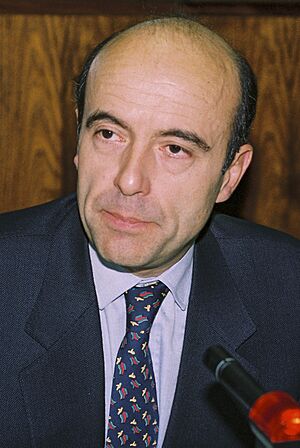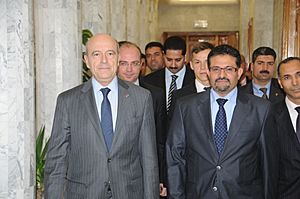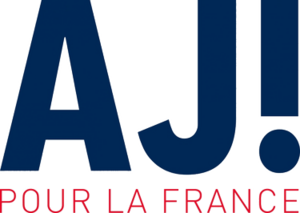Alain Juppé facts for kids
Quick facts for kids
Alain Juppé
|
|
|---|---|
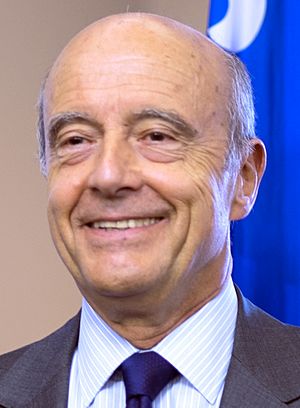
Juppé in 2015
|
|
| Member of the Constitutional Council | |
| Assumed office 12 March 2019 |
|
| Appointed by | Richard Ferrand |
| President | Laurent Fabius |
| Preceded by | Lionel Jospin |
| Prime Minister of France | |
| In office 17 May 1995 – 2 June 1997 |
|
| President | Jacques Chirac |
| Preceded by | Édouard Balladur |
| Succeeded by | Lionel Jospin |
| Minister of Foreign and European Affairs | |
| In office 27 February 2011 – 15 May 2012 |
|
| President | Nicolas Sarkozy |
| Prime Minister | François Fillon |
| Preceded by | Michèle Alliot-Marie |
| Succeeded by | Laurent Fabius |
| In office 29 March 1993 – 18 May 1995 |
|
| Prime Minister | Édouard Balladur |
| Preceded by | Roland Dumas |
| Succeeded by | Hervé de Charette |
| Minister of Defence and Veterans Affairs | |
| In office 14 November 2010 – 27 February 2011 |
|
| President | Nicolas Sarkozy |
| Prime Minister | François Fillon |
| Preceded by | Hervé Morin (Defence) |
| Succeeded by | Gérard Longuet |
| Minister of Ecology and Sustainable Development | |
| In office 18 May 2007 – 18 June 2007 |
|
| President | Nicolas Sarkozy |
| Prime Minister | François Fillon |
| Preceded by | Nelly Olin (Environment) |
| Succeeded by | Jean-Louis Borloo (Ecology, Energy, Sustainable Development and Sea) |
| Mayor of Bordeaux | |
| In office 8 October 2006 – 7 March 2019 |
|
| Preceded by | Hugues Martin |
| Succeeded by | Nicolas Florian |
| In office 19 June 1995 – 13 December 2004 |
|
| Preceded by | Jacques Chaban-Delmas |
| Succeeded by | Hugues Martin |
| Spokesperson of the Government | |
| In office 20 March 1986 – 10 May 1988 |
|
| Prime Minister | Jacques Chirac |
| Preceded by | Georgina Dufoix |
| Succeeded by | Claude Évin |
| Delegate Minister of the Budget | |
| In office 20 March 1986 – 10 May 1988 |
|
| Prime Minister | Jacques Chirac |
| Preceded by | Henri Emmanuelli |
| Succeeded by | Pierre Bérégovoy |
| Personal details | |
| Born |
Alain Marie Juppé
15 August 1945 Mont-de-Marsan, Aquitaine, France |
| Political party | RPR (before 2002) UMP (2002–15) The Republicans (2015–18) |
| Spouses |
Christine Leblond
(m. 1965; div. 1993)Isabelle Legrand-Bodin
(m. 1993) |
| Children | 3 |
| Alma mater | École normale supérieure Sciences Po École nationale d'administration |
| Signature |  |
Alain Marie Juppé (born 15 August 1945) is a French politician. He was the Prime Minister of France from 1995 to 1997. During this time, he worked under President Jacques Chirac. He also served as the mayor of Bordeaux for many years.
Juppé has held several important roles in the French government. These include being the Minister of Foreign Affairs and the Minister of Defence. He is a member of The Republicans political party. In 2019, he became a member of the French Constitutional Council.
Contents
Early Life and Education
Alain Marie Juppé was born on 15 August 1945, in Mont-de-Marsan, France. His father, Robert Juppé, was a farmer and a resistance fighter during World War II. His mother, Marie Darroze, was a devoted Catholic.
Juppé finished high school at 17. He then moved to Paris to continue his studies. He attended the École Normale Supérieure and earned a degree in Classics. He also studied at Sciences Po and the National School of Administration (ENA). These schools are very important for people who want to work in French public service.
Political Career
Starting in Politics (1976–1986)
Alain Juppé started his career as an Inspector of Finances. This is a high-level job in the French government. He later took time off from this job to work in politics.
In the late 1970s, he met Jacques Chirac, who was a major political figure. Juppé became an advisor to Chirac in the Paris city council. He joined the RPR political party when it was founded in 1976. He worked closely with Chirac and helped manage his presidential campaign in 1981.
Becoming a Cabinet Member (1986–1995)
From 1986 to 1988, Juppé served as the Minister of Budget and the spokesperson for Jacques Chirac's government. He helped with the government's economic policies.
He then became the secretary general of the Rally for the Republic (RPR) party from 1988 to 1995. In 1993, he became the Minister of Foreign Affairs under Prime Minister Édouard Balladur. He was involved in important international discussions, including France's role in Rwanda. Many people thought he was one of France's best Foreign Ministers.
Prime Minister of France (1995–1997)
In 1995, Jacques Chirac became President, and he chose Alain Juppé to be his Prime Minister. Chirac said Juppé was "the best among us."
However, Juppé's time as Prime Minister was challenging. In late 1995, his plans for changes to the social welfare system led to large strikes across France. These strikes caused many problems and made him very unpopular. He eventually had to change his plans.
In 1997, President Chirac called for new elections, but his party lost. Alain Juppé was replaced by Lionel Jospin as Prime Minister. After this, Juppé also stepped down as the leader of the RPR party.
He then worked to unite different center-right parties. This led to the creation of the Union for a Popular Movement (UMP) party. Juppé was the first president of the UMP from 2002 to 2004. He was also elected Mayor of Bordeaux in 1995.
A Break from Public Life (1999–2006)
In 2004, Alain Juppé faced a legal issue related to how his political party used staff from the City of Paris. He was found responsible for this issue. As a result, he resigned from his position as mayor of Bordeaux. He also took a break from politics for a while.
During this time, he taught public administration at a university in Montreal, Canada.
Returning to Public Service (2006–2010)
Juppé returned to politics in 2006. He was re-elected as Mayor of Bordeaux in October 2006. This showed that voters in Bordeaux still supported him.
In May 2007, he briefly served as the Minister of Ecology and Sustainable Development. However, he resigned a month later after not winning a seat in the legislative elections. On 9 March 2008, he was re-elected as Mayor of Bordeaux with a strong majority.
Back in Government (2010–2012)
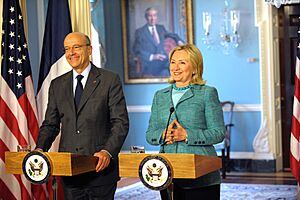
In 2010, President Nicolas Sarkozy asked Alain Juppé to return to the government. Juppé accepted the role of Minister of Defence.
In 2011, he became the Minister of Foreign Affairs. This was during a time of big changes in many Arab countries, known as the Arab Spring. He supported international action in Libya. He also spoke about the situation in Syria.
Aiming for President (2012–2016)
After his party lost the 2012 presidential election, Juppé stayed out of the spotlight for a bit. In March 2014, he was again re-elected as mayor of Bordeaux.
In 2015, Juppé announced he would run in his party's primary election to become the candidate for the 2017 presidential election. He was a popular politician and was seen as a more moderate choice than some other candidates. He received support from former President Jacques Chirac and other centrist politicians.
In the primary election on 20 November 2016, Juppé came in second place. He then went into a final round against François Fillon. A week later, he lost to Fillon and officially supported him.
Constitutional Council (2019)
On 13 February 2019, it was announced that Juppé would join the Constitutional Council. This is a very important group that makes sure French laws follow the constitution. Because of this new role, he resigned as mayor of Bordeaux in March 2019.
Political Views
Social Issues
In 2009, Juppé disagreed with comments made by Pope Benedict XVI about the AIDS crisis. He said that as a Christian, he found such statements unacceptable. He also received an award from Armenia for helping to improve relations between France and Armenia.
European Union
Alain Juppé's views on the European Union have changed over time. Early in his career, he favored a "Europe of the peoples" rather than a strong central European government.
However, in 1992, he helped convince Jacques Chirac to support the Maastricht Treaty. This treaty was a big step towards closer European cooperation and the creation of the Euro currency. Later, he seemed to have some regrets about how the treaty was set up. But in 2011, he strongly supported the idea of a European federation to help solve economic problems.
In 2015, during the Greek debt crisis, he first suggested Greece might leave the Eurozone, but then changed his mind. After the Brexit vote in 2016, he said France should not have a similar vote.
Immigration and Islam
Juppé's views on immigration have also changed. In 1977, he suggested giving job preference to French citizens. In 1990, he called immigration a "permanent and huge" problem. At that time, his party proposed strict rules, like closing borders.
However, in the late 1990s, his position became more open. He supported a report that suggested France needed more immigrants for its workforce. In 2002, he said that French people understood the need to welcome more foreigners. He believes in "integration" rather than forcing people to completely change their culture. His views have sometimes been criticized by the right-wing of his party.
In 2010, he said he did not support a French ban on face coverings, because he did not want to "stigmatize Islam." He also stated that people who follow Islam can still accept the basic rules of democracy. In 2016, he suggested moving the UK border from Calais to Kent.
List of Offices Held
Government Roles
- Prime Minister: 1995–1997
- Minister of Budget and government spokesperson: 1986–1988
- Minister of Foreign Affairs: 1993–1995
- Minister of Ecology, Development and Sustainable Planning: May–June 2007
- Minister of State, Minister of Defense and Veterans Affairs: 2010–2011
- Minister of State, Minister of Foreign and European Affairs: 2011–2012
Elected Positions
European Parliament
- Member of European Parliament: 1984–1986, June–October 1989
National Assembly of France
- Member of the National Assembly of France for Paris (18th constituency): 1988–1993
- Member of the National Assembly of France for Gironde (2nd constituency): 1997–2004
Municipal Council
- Mayor of Bordeaux: 1995–2004, 2006–2019
- Municipal councillor of Bordeaux: 1995–2004, 2006–2019
- Deputy-mayor of Paris XVIIIe: 1983–1995
- Councillor of Paris: 1983–1995
Urban Community Council
- President of the Urban Community of Bordeaux: 1995–2004, 2014–2019
- Vice-president of the Urban Community of Bordeaux: 2006–2014
- Member of the Urban Community of Bordeaux: 1995–2004, 2006–2019
Political Party Roles
- President of the Rally for the Republic: 1994–1997
- President of the Union for a Popular Movement: 2002–2004
Books by Alain Juppé
- La Tentation de Venise, Grasset, 1993.
- Entre nous, NiL, 1996.
- Montesquieu, Perrin-Grasset, 1999.
- Entre quatre z'yeux, with Serge July, Grasset, 2001.
- France, mon pays : lettres d'un voyageur, with Isabelle Juppé, Laffont, 2006.
- Je ne mangerai plus de cerises en hiver, Plon, 2009.
- La Politique, telle qu'elle meurt de ne pas être, with Michel Rocard, J.-C. Lattès, 2010.
- Mes chemins pour l’école, J.-C. Lattès, 2015.
- Pour un État fort, Paris, J.-C. Lattès, 2016.
- De vous à moi, 2016.
Images for kids
See also
 In Spanish: Alain Juppé para niños
In Spanish: Alain Juppé para niños
 | Jewel Prestage |
 | Ella Baker |
 | Fannie Lou Hamer |


